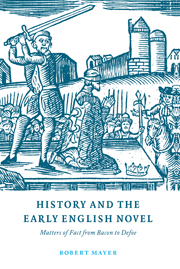Book contents
- Frontmatter
- Contents
- List of illustrations
- Acknowledgments
- Introduction
- 1 Baconian historiography: the contours of historical discourse in seventeenth-century England
- 2 “Idle Trash” or “Reliques of Somthing True”?: the fate of Brut and Arthur and the power of tradition
- 3 The History of Myddle: memory, history, and power
- 4 Lifewriting and historiography, fiction and fact: Baxter, Clarendon, and Hutchinson on the English Civil War
- 5 The secret history of the last Stuart kings
- 6 “Knowing strange things”: historical discourse in the century before Robinson Crusoe
- 7 “History” before Defoe: Nashe, Deloney, Behn, Manley
- 8 Defoe's historical practice: from “The Ages Humble Servant” to Major Alexander Ramkins
- 9 “Facts that are form'd to touch the mind”: Defoe's narratives as forms of historical discourse
- 10 From history to the novel: the reception of Defoe
- Conclusion
- Index
- CAMBRIDGE STUDIES IN EIGHTEENTH-CENTURY ENGLISH LITERATURE AND THOUGHT
Conclusion
Published online by Cambridge University Press: 31 October 2009
- Frontmatter
- Contents
- List of illustrations
- Acknowledgments
- Introduction
- 1 Baconian historiography: the contours of historical discourse in seventeenth-century England
- 2 “Idle Trash” or “Reliques of Somthing True”?: the fate of Brut and Arthur and the power of tradition
- 3 The History of Myddle: memory, history, and power
- 4 Lifewriting and historiography, fiction and fact: Baxter, Clarendon, and Hutchinson on the English Civil War
- 5 The secret history of the last Stuart kings
- 6 “Knowing strange things”: historical discourse in the century before Robinson Crusoe
- 7 “History” before Defoe: Nashe, Deloney, Behn, Manley
- 8 Defoe's historical practice: from “The Ages Humble Servant” to Major Alexander Ramkins
- 9 “Facts that are form'd to touch the mind”: Defoe's narratives as forms of historical discourse
- 10 From history to the novel: the reception of Defoe
- Conclusion
- Index
- CAMBRIDGE STUDIES IN EIGHTEENTH-CENTURY ENGLISH LITERATURE AND THOUGHT
Summary
The question of the relationship between history and fiction had been a pressing one in discussions of English prose fiction at least since the end of the sixteenth century when Sidney wrote his Apology for Poetry. From Sidney's day down to at least the early eighteenth century, the discourse of history featured certain elements of practice that suggested that fictional material would be tolerated even within putatively “scientific” historical discourse or that fiction could be used as a means of historical representation. These elements of practice included sharp polemic; traditional material tolerated within historical texts despite its fabulous character; gossip and hearsay; rhetorical battles with other historians; the taste for strange things; the habit of telling history from the point of view of a far from disinterested individual; and the capacity of certain historical texts to press against the boundary between history and fiction. Thus the seventeenth century was indeed, as Michael McKeon has argued, a time of “categorial instability,” and this unsettled state of affairs was reflected in both fictional and historical discourse. I have shown that in the course of his career as a writer Defoe produced works that participated in both of these discursive formations, arguing, more specifically, that in presenting works initially situated within the discourse of history he came to have a revolutionary impact upon fictional discourse. As a result, Defoe's narratives played a key part in that series of developments that eventuated in a shift in the horizon of expectations of early modern readers that pointed toward the emergence of a discourse of the novel.
- Type
- Chapter
- Information
- History and the Early English NovelMatters of Fact from Bacon to Defoe, pp. 227 - 239Publisher: Cambridge University PressPrint publication year: 1997

